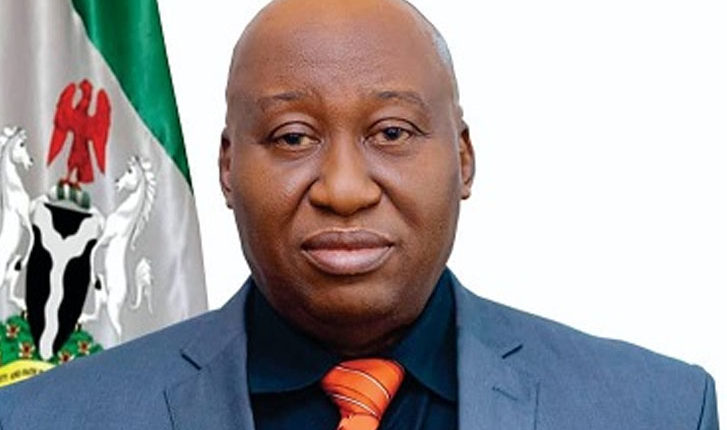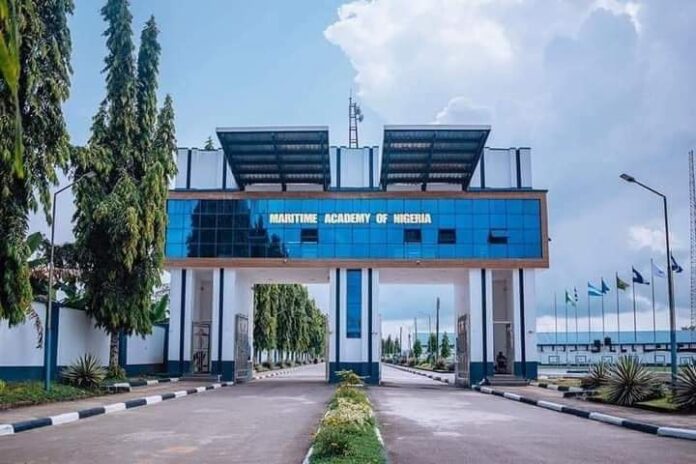Rot in Nigeria Maritime Academy: At least 13 Master Mariners and Marine Engineers quit the institution in the last five years, with only two professionals of that calibre left to provide instructions to hundreds of students. Institution’s rector accused of oppressive management tactics, supplying only one hour of electricity to living quarters of lecturers, other staff, and ignoring plea for improved welfare.
By Ishaya Ibrahim, News Editor
Nigeria’s premier maritime institute, the Maritime Academy of Nigeria in Oron, Akwa Ibom State, appears crippled by self-imposed crisis, according to multiple sources familiar with the institution.
The crisis is not a result of poor funding. The institution is entitled to 5% of the earnings of the Nigerian Maritime Administration and Safety Agency (NIMASA), which is huge.
For instance, going by the 2021 earnings of NIMASA, which is N37 billion, the Maritime Academy of Nigeria would have received at least N1.8 billion for that year. This is aside fees paid by students of the institution known as cadets and seafarers doing short courses there.

But in the last five years, at least 13 master mariners and marine engineers are said to have quit this federal government owned maritime school in protest over its leadership’s alleged oppressive style of management, poor welfare package and supplying their living quarters with electricity not more than one hour a day.
During the last two matches of Africa Cup of Nations (AFCON), the electricity ration for the staff increased to four hours. Now that AFCON is over, the blackout resumes.
It was gathered that the former management of the institution had disconnected the school from public power source due to outrageous bill. Generators were set up which provided 24 hours power to the school and staff quarters. “When this rector came, he cut it to six hours, later four hours and now one hour,” a member of staff told our reporter.
READ ALSO: Court orders FG to investigate, prosecute killers of Dele Giwa, others
The Master Mariners
A master mariner is a licensed mariner who holds the highest grade of seafarer qualification.
For context, a master mariner is a commander of a vessel who protects his ship, crew and cargoes, and acts as first responder in search and rescue efforts should the need arise.

Those with the expertise of master mariners are rare to find. And to have them teaching the rudiments of the job in a classroom is even rarer.
The Maritime Academy in Oron used to be the hub of these master mariners and marine engineers who were the backbone of the institution.
But in the last five years, sources familiar with the running of the institution said most of them have left.
Why they quit
In the course of this investigation, TheNiche spoke with three master mariners who once taught in the institution. They all accused the rector, Commodore Emmanuel Effedua (retd) of dictatorship. One of them said he runs the place like a one-man business.

“He talks to them anyhow,” a source close to the rector but who wishes not to be named, told TheNiche.
The source said the institution currently has only two master mariners to a ratio of hundreds of students (both regular cadets and those coming for short courses).
An incomplete list of those that have left the institution in the last five years obtained by TheNiche include; (1) Capt. F Balogun, (2) Capt. Endoyan, (3) Capt. Alimi, (4) Capt Ponu, (5) Capt. Gabriel Okwu (6) Late Capt. Ahia.
“The institution is a marine institution comprising three schools. That is, marine engineering, marine navigation and maritime business. They don’t have lecturers for the major courses of marine engineering and marine navigation. And they are telling people that they have professors and doctors. Professors and doctors are not the ones who teach the professional subjects and they cannot take those courses. The school has no lecturers,” a master mariner who once taught in the school, told our reporter in confidence.
He added: “I call it one-man school. That is the way it’s being run. A place that you have light for only one hour a day. When lecturers close from work, where will they see light to prepare for the next day lecture? Are they not supposed to prepare?”
He lamented that the institution is suffering from shortage of experts.
Hear him: “Ask people who are doing certificate of competency now preparing for NIMASA exams. Ask them how many lecturers they have taking them. NIMASA people that come there to conduct exams know the situation in that school. Everybody will just be keeping quiet. I don’t know why. Until we have a professional running that school who will say okay, you master mariners, marine engineers I will pay you N2 million a month and see if you will not have good lecturers and see whether the school will not go forward.
“Why are they recognizing Ghana and not recognizing Nigeria? Why are the certificates NIMASA is giving not acceptable in foreign ships? NIMASA gives money quarterly to the Academy. What are they doing with that money?”

Appointment bazaar
The rector is also being accused of populating the institution with contract staff, paying them more than those in regular federal government employment, and placing them as heads of departments that are said to be strategic, like marine transport and ICT.
One source said when they complained of being paid less than the contract staff, he advised them to resign and apply as contract staff, that he would recruit them.
When TheNiche called the telephone line of the rector, Commodore Emmanuel Effedua (retd), he did not take the call. He also did not reply a text message sent to his line. However, hours after the call, a man called our reporter introducing himself as a journalist and friend of the Maritime Academy. While he said he shouldn’t be quoted, he issued a subtle threat to our reporter. “When push comes to shove, you will be looking for those who gave you the information, and they will not agree to come,” he said.
NIMASA’s public relations officer, Osagie Edward simply told our reporter when contacted that he would crosscheck the queries raised and revert. He did not do so more than twenty-four hours after.













